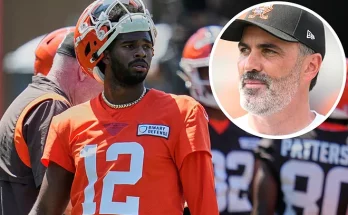Brian Kelly isn’t one to mince words. The LSU head coach, known for his sharp wit and unfiltered commentary, made headlines once again—this time for calling into question the seemingly unstoppable hype surrounding Texas quarterback Arch Manning. While the college football world has spent the offseason buzzing about Manning’s potential breakout season, Kelly isn’t so quick to crown the former No. 1 recruit as the second coming of college football royalty.
In a recent interview that sent shockwaves through SEC circles, Kelly was asked about the upcoming season’s quarterback battles and the names he’s watching. Naturally, Arch Manning came up—a name that has echoed through stadiums and locker rooms for years, long before he ever took a snap for the Texas Longhorns. Kelly’s response? A subtle, measured takedown that felt more like a warning shot than a compliment.
“Look, I respect the Manning family. No one’s questioning the pedigree,” Kelly began, choosing his words carefully but clearly. “But you still have to prove it on the field. Hype doesn’t win football games. Performance does.”
Those comments, though brief, have sparked a firestorm of reactions across the college football landscape. Was Kelly simply speaking truth to power? Or was he stirring the pot before what many expect to be a high-stakes season for both LSU and Texas? Either way, it’s clear that Kelly is not buying into the media frenzy that has surrounded Manning since the moment he committed to Texas.
Arch Manning, the nephew of NFL legends Peyton and Eli Manning and grandson of former Ole Miss quarterback Archie Manning, has carried the weight of expectation on his shoulders from the beginning. He was the most coveted recruit of the 2023 cycle, with schools from across the nation throwing everything at him—from NIL deals to legacy pitches—in hopes of landing a quarterback with both elite bloodlines and raw talent. Ultimately, he chose Texas, a decision that set the stage for an era-defining moment in Longhorns history.
Yet despite his high school dominance and near-mythical recruiting profile, Manning saw limited action in his freshman season, sitting behind Quinn Ewers and learning from the sidelines. With Ewers now in the NFL, the keys to the Texas offense appear to be in Manning’s hands. The pressure? Immense. The expectations? Stratospheric.
And that’s exactly what Kelly seems to be pushing back against.
“You can be talented, you can have a name, you can have the media machine behind you,” Kelly continued in his remarks, “but college football doesn’t care about any of that. The SEC certainly doesn’t.”
Some interpreted Kelly’s comments as sour grapes. LSU and Texas are not scheduled to face each other during the regular season, but the two programs are destined to collide in recruiting battles and, potentially, in postseason play. Kelly, a coach who has led LSU to multiple top-10 finishes and remains laser-focused on returning the Tigers to national championship contention, may be using Manning’s media magnetism as a way to motivate his own squad—or to highlight how LSU’s success has come not from name recognition, but from grinding it out on Saturdays.
Others saw it as a legitimate critique of a system that often rewards potential over performance. Manning, after all, has not yet thrown a touchdown pass in a college game. He’s flashed in spring practices and drawn praise from coaches for his work ethic, but the actual sample size is too small to draw meaningful conclusions. And in the brutal, unforgiving arena of the SEC, that can make all the difference.
“You don’t get a pass because of your last name,” Kelly added. “You earn your reputation in this league snap by snap, drive by drive. There’s no shortcuts.”
To be fair, Kelly is not alone in this sentiment. Several analysts and former players have echoed similar concerns, noting that while Manning has all the tools to be great—arm strength, poise, leadership—he still has to put it all together on the field. And with Texas transitioning into the SEC this season, the learning curve will be steeper than ever.
What makes Kelly’s comments so impactful, however, is the timing. Texas has been riding a wave of momentum since its return to national relevance under Steve Sarkisian. A strong 2024 campaign, punctuated by a playoff appearance, has reawakened the belief that Texas is “back.” Arch Manning is supposed to be the final piece of that puzzle—the golden-armed savior who brings the Longhorns their first national title since Vince Young’s heroics in 2005.
But Brian Kelly isn’t buying the fairytale. In fact, he seems to be positioning his own program as a foil to the media-fueled Texas narrative. LSU’s rise under Kelly has been steady, disciplined, and rooted in proven development. He’s transformed a program in turmoil into a perennial contender, recruiting top-tier talent while demanding accountability every step of the way.
When asked whether he thought Manning would live up to the expectations, Kelly shrugged. “That’s for him to decide. But the SEC is going to ask the question, and they’re going to ask it loud.”
The underlying message? If Arch Manning isn’t ready, the league will expose him. Quickly.
Kelly’s remarks may also reflect a larger cultural shift in college football—one where NIL deals, social media followings, and brand value increasingly factor into a player’s perceived worth. In that environment, a quarterback with the last name “Manning” is bound to be marketed as a generational figure before he’s even earned a starting job. But for traditionalists like Kelly, that’s not how greatness is defined.
“Football’s still a game of toughness and execution,” Kelly said. “I don’t care how many Instagram followers you have or what your NIL valuation is. Can you read a defense? Can you lead your team in the fourth quarter with everything on the line? That’s what separates the good from the great.”
Predictably, reactions to Kelly’s comments have been mixed. Texas fans and Manning supporters called them disrespectful, accusing Kelly of taking a cheap shot at a young player who has handled the pressure with remarkable maturity. Others, particularly from rival SEC fanbases, applauded the candor and agreed that Manning still has much to prove.
Even Sarkisian responded with a touch of diplomacy, stating, “We have nothing but respect for Coach Kelly and LSU. Arch is working hard every day to prepare for the season, and we’re confident in his development.”
But inside Texas’ locker room, Kelly’s remarks may be used as bulletin-board material. Manning, by all accounts, is a quiet competitor who doesn’t need much extra motivation. However, being publicly challenged by one of the SEC’s most high-profile coaches adds another layer of urgency—and pressure—to his journey.
The spotlight is now even brighter.
Still, if Kelly’s intent was to rattle Manning or Texas, it’s unlikely to work. Arch Manning has been groomed for the limelight since he was a teenager. He’s grown up in quarterback meetings with Peyton and Eli, trained with elite coaches, and learned how to navigate a media storm with grace. By all indications, he’s grounded, humble, and driven.
But Kelly’s point remains: until Manning proves it between the lines, the hype is just that—hype.
For Kelly, the bigger picture is clear. He’s building a program at LSU that doesn’t rely on narrative. He’s hunting championships, not headlines. And if questioning the sport’s most talked-about young star helps shift attention away from his own players—or sets the tone for how serious the SEC gauntlet will be—then so be it.
As the 2025 season inches closer, all eyes will be on Austin. Can Arch Manning meet the moment? Will he silence the doubters, like Kelly, and fulfill the immense expectations placed upon him? Or will he falter under the weight of a legacy he didn’t ask for but has never shied away from?
One thing’s for sure: Brian Kelly will be watching. And he won’t be the only one.



